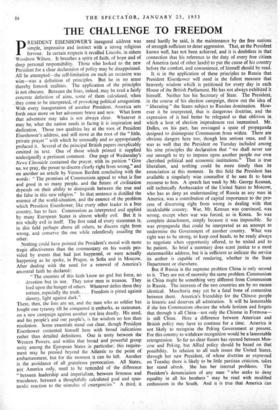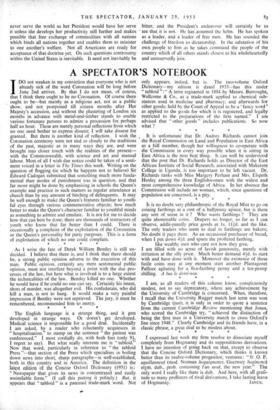THE CHALLENGE TO FREEDOM
pRESIDENT EISENHOWER'S inaugural address was simple, impressive and instinct with a strong religious fervour. In certain respects it recalled Lincoln, in others Woodrow Wilson. It breathes a spirit of faith, of hope and of deep personal responsibility. Those who looked to the new President for a clear declaration of policy may be disappointed.
All he attempted—the self-limitation on such an occasion was wise—was a definition of principles. But he in no sense thereby forsook realities. The application of the principles is not obscure. Between the lines, indeed, may be read a fairly concrete definition of aims, some of them calculated, when they come to be interpreted, of provoking political antagonism. With every inauguration of another President, America sets forth once more on her adventure brave and new. What form that adventure may take is not always clear. Whatever it may be, what the nation needs in facing it is inspiration and dedication. Those two qualities lay at the root of President Eisenhower's address, and still more at the root of the "little, private prayer" with which he unusually and so appropriately prefaced it. Several of the principal British papers_inexplicably omitted its text. One of those which printed it supplied undesignedly a pertinent comment. One page of Wednesday's News Chronicle contained the prayer, with its petition "Give us, we pray, the power to discern clearly right from wrong," and on another an article by.Vernon Bartlett concluding with the words: "The promises of Communism_appeal to what is fine and good in so many people, and the future of civilisation depends on their ability to distinguish between the true and the false in this new religion." In that sentence is distilled the essence of the world-situation, and the essence of the problem which President Eisenhower, like every other leader in a free country, has to face. Communism as interpreted and applied by many European States is almost wholly evil. But it is not wholly evil in itself. The first need of every statesman is,- in this field perhaps above all others, to discern right from wrong, and conserve the one while relentlessly assailing the other.
Nothing could have pointed the President's moral with more tragic effectiveness than the commentary on his words pro- vided by events that had just happened, or were actually happening as he spoke, in Prague, in Sofia and in Moscow. 'After dealing with the need for a renewal of America's ancestral faith he declared : "The enemies of this faith 'know no god but force, no - devotion but its use. They tutor men in treason. They feed upon the hunger of others. Whatever defies them they torture, especially the truth. . . . Freedom is pitted against slavery, light against dark.", There, then, the lists are set, and the man who as soldier has fought one tyranny till he conquered it embarks, as statesman, on a new campaign against another not less deadly. His need, and his people's and our people's, is for wisdom no less than resolution. Some essentials stand out clear, though President Eisenhower contented himself here with broad indications rather than detailed definitions. One is unity between the Western Powers, and within that broad and powerful group unity among the European States in particular: this require- ment may be pressed beyond the Atlantic to the point of embarrassment, but for the moment it can be left. Another is the avoidance of all gratuitous provocation. All States, not America only, need to be reminded of the difference "between leadership and imperialism, between firmness and truculence, between a thoughtfully calculated goal and spas- modic reaction to the stimulus of emergencies." A third, it need hardly be said, is the maintenance by the free nations of strength sufficient to deter aggression. That, as the President knows well, has not been achieved, and it is doubtless in that connection that his reference to the duty of every free citizen of America (and of other lands) to put the cause of his country before the comfort, and convenience, of himself should be read.
It is in the application of these principles to Russia that President Eisenhower will need in the fullest measure that heavenly wisdom which is petitioned for every day in each House of the British Parliament. He has not always exhibited it himself. Neither has his Secretary of State. The President, in the course of his election campaign, threw out the idea of " liberating " the States subject to Russian domination. How- ever it be interpreted, that is dangerous doctrine, and the expression of it had better be relegated to that oblivion in _ which a host of election imprudences rest immunised. Mr. Dulles, on his part, has envisaged a spate of propaganda designed to disintegrate Communism from within. There are obvious dangers here too, though less serious ones, and it was as well that the President on Tuesday included among his nine principles the declgation that "we shall never use our strength to try to impress upon another people our own cherished political and economic -institutions." That is true liberalism, and nothing could be more timely than its enunciation at this moment. In this field the President has available a singularly wise counsellor if he sees fit to have recourse to him. A speech last week by Mr. George Kenuan, still technically Ambassador of the United States to Moscow, who has as deep an understanding of Russia as any man in ' America, was a contribution of capital importance to the pro- cess of discerning right from wrong in dealing with •that incalculable country. War, Mr. Kennan was convinced, was wrong, except when war was forced, as in Korea. So was complete detachment, simply because it was impossible. So was propaganda that could be interpreted as an attempt to undermine the Governmpnt of another country. What was right was to be strong, to keep cool heads, to be ready always to negotiate when opportunity offered, to be united and to be patient. So brief a summary does scant justice to a most statesmanlike address, but it is sufficient to indicate the service its author is capable of rendering, whether in the State Department or elsewhere.
But if Russia is the supreme problem China is' only second to it. They are not of necessity the same problem. Communism in China might be something very different from Communism in Russia. The interests of the two countries are by no means identical. Manchuria may yet be a fatal bone of contention between them. America's 'friendship for the Chinese people is historic and deserves all admiration. It will be lamentable if she lets Communism obscure the whole horizon and forgets that through it all China—not only the Chinese in Formosa— is still China. Here a difference between American and British policy may have to continue for a time. America is not likely to recognise the Peking Government at present. For this country to withdraw recognition would be a lamentable retrogression. So far no clear fissure has opened between Mos- cow and Peking, but Allied policy should be based on that possibility. In relation to all such issues the United States, through her new President, of whose doctrine as expressed on Tuesday there is likely to be little partisan criticism, takes her stand afresh. She has her internal problems. The President's denunciation of any man "who seeks to deny equality in all his brothers" may be read with modified • enthusiasm in the South. And it is true that America can never serve the world as her President would have her serve it unless she develops her productivity still further and makes possible that free exchange of commodities with all nations which binds all nations together and enables them to minister to one another's welfare. Not all Americans are ready for acceptance of that doctrine yet. On such questions controversy within the United States is inevitable. It need not inevitably be bitter, and the President's endeavour will certainly be to see that it is not. He has assumed the helm. He has spoken as a leader, and a leader of free men. He has sounded the challenge of freedom to dictatorship. In the salutation of his own people to him as he takes command the people of the country which of all others stands closest to his wholeheartedly and unreservedly join.



































 Previous page
Previous page